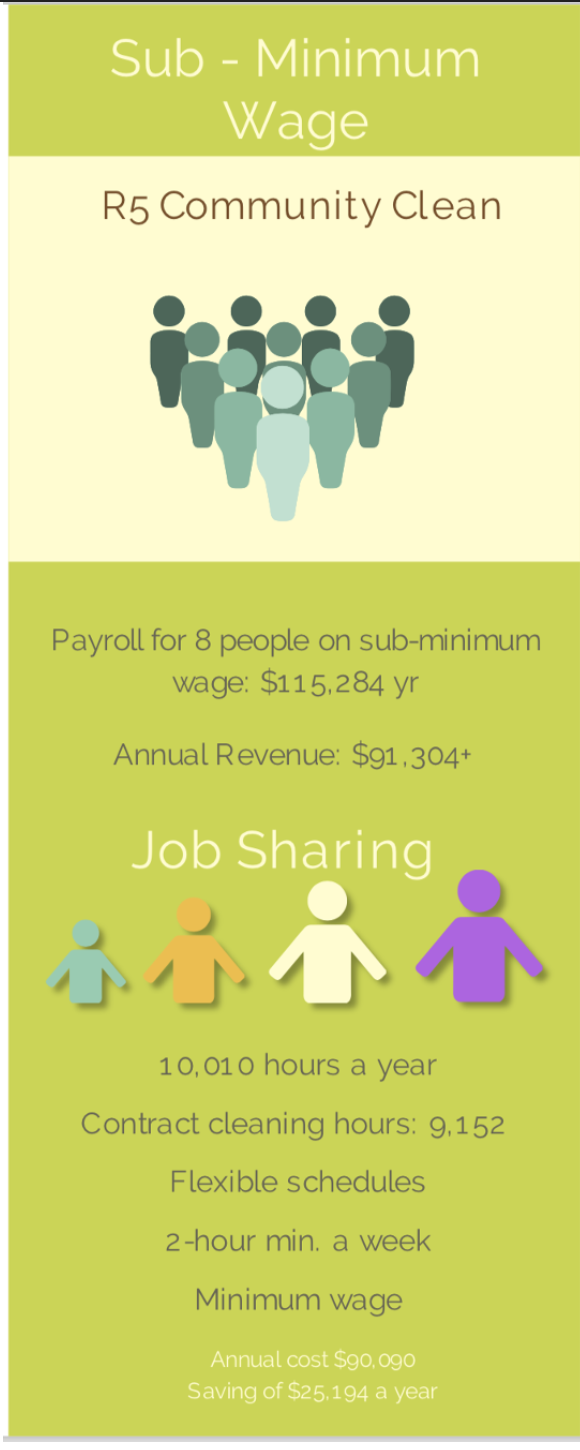Learn as you Earn
The R5 Recycling Center provides “Learn as you Earn” opportunities for individuals with or without disabilities. The environment is rich with learning opportunities for a variety of soft and hard skills needed in today’s job economy. Though personalized learning programs and group learning events, job share employees are provided with as close to real world training and hands on experience that they can take with them and transition into working for employers in the community.
Design
The Transition 2018 Project encompassed designing and delivering a” Learn as you Earn Job Sharing” program. One problem identified through analysis indicated that restructuring and skills gap training were needed to bridge the transition. The organization supported the transition and development of individual skills training through action mapping processes and SMART goal creation.
Development
The job share, flexible schedule positions at the R5 Recycling Center focus on learning within the key areas associated with Tasks, Skills, Tools, Ability, Knowledge, Work Environment, Worker Style, and Work Values in a recycling processing center.
Project Insights
The R5 Recycling Center project demonstrated how integrating educational programs into workplace settings can provide valuable skills and opportunities for individuals with disabilities while promoting a diverse and inclusive workforce that includes non-disabled employees. Look below for more information, such as key achievements, project outcomes, and development tools.
-
Curriculum Development:
We designed a comprehensive, hands-on curriculum covering essential tasks such as sorting recyclable materials, operating equipment like forklifts and balers, and following safety protocols. This practical training was crucial for building participants' confidence and skills.
The curriculum also featured modules on soft skills, including communication, teamwork, and problem-solving, which are vital for success in any workplace.
Instructional Strategies:
To ensure the learning experience was accessible and engaging, we utilized various instructional methods, including interactive training sessions that promoted active participation and understanding.
A blended learning model combined face-to-face instruction with online resources to cater to different learning preferences and needs.
Accessibility and Inclusivity:
The program prioritized inclusivity, making accommodations for participants with disabilities by adapting tasks and providing assistive technologies as needed.
We fostered a workplace culture that valued diversity and inclusion, employing individuals with disabilities and non-disabled employees. This approach enriched the work environment and promoted mutual understanding and respect among all staff members.
-
Workplace Integration:
The program was successfully integrated into the recycling center's operations, allowing participants to gain practical work experience while earning a fair wage. This model helped prepare participants for broader employment opportunities in the community.
Skill Development:
Participants acquired various skills, from technical proficiency in machinery operation to essential interpersonal skills such as effective communication and teamwork. These competencies are crucial for their professional development and employment readiness.
Cost Efficiency and Impact:
The transition from a sub-minimum wage sheltered workshop to a minimum wage job-sharing model proved economically beneficial, resulting in cost savings and improved operational efficiency. This change highlighted the social and economic benefits of inclusive workforce development.
-
Learn as You Earn project emphasized the significance of accessible and inclusive learning environments in workforce development. Looking ahead, we plan to:
Expand Skill Training:
Introduce more advanced technical skills training to enhance participants' employability.
Develop Partnerships:
Establish relationships with local businesses to create additional job opportunities and facilitate a smooth transition into the broader workforce.
Continuous Improvement: Continuously refine the curriculum based on feedback from participants and stakeholders to ensure it aligns with evolving industry needs and standards.
-
Individuals with disabilities, their families, and guardians welcomed the opportunity to learn real-world skills and earn competitive wages.
-
Feedback from families, guardians and individuals with disabilities was positive. Public image and relationships with community businesses through R5 cleaning services were strengthened and increased
-
Microsoft Word
Microsoft PowerPoint
Canva
Adobe Photoshop
Adobe PDF




